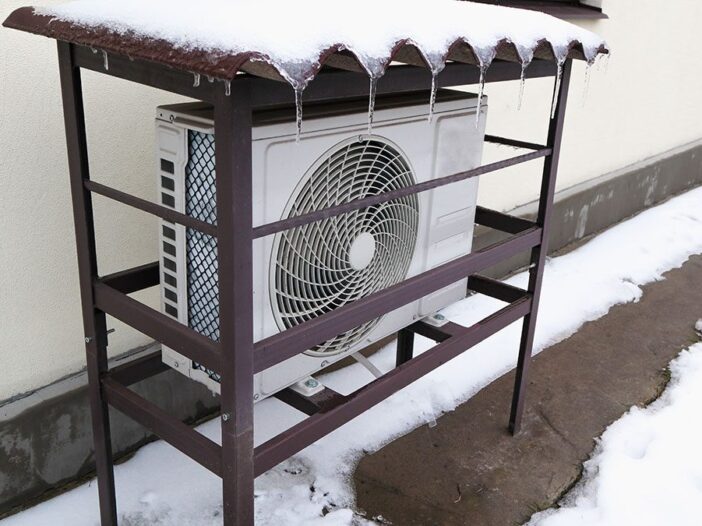
If you have a ductless HVAC system, should you be covering your outdoor condenser? In general, your condenser is relatively protected already and there is no need to cover it from mild to moderate weather events.
But many homeowners still take precautions to protect their condensers from heavy rain, ice, snow, and debris. Let’s take a look below at the benefits of protecting your condenser, when to cover it, and what to use.
Rain
Condenser units are built to be installed outdoors and can withstand even heavy rain and winds just fine without a cover. However, you should take care to ensure that water doesn’t pool around the base of the unit, as this could lead to rust or other damage.
If you live in an area with particularly a lot of rain, you may want to consider investing in a drain pan for your condenser unit. This will help to keep the area around the unit clean and dry and prevent any accidental flooding.
You should also check around your unit for debris after storms and remove any leaves, twigs, or other objects from around your condenser as soon as the weather event has subsided. If your condenser vents become obstructed, this could negatively impact your ductless HVAC system’s efficiency and cause premature wear and tear.
Snow & Ice
Outdoor condensers can also withstand extreme temperatures, but should also not be allowed to collect snow or ice for the same reason as debris. If you don’t have a cover, you can remove snow from your condenser periodically with a broom or a brush throughout a storm to prevent accumulation.
However, covers come in handy during the winter when it comes to ice that’s difficult to scrape off. You can simply remove the cover, break and shake off the ice, and replace it on the clean condenser unit.
Make sure you get a specially designed condenser cover that’s the right size for your unit. A tarp isn’t a good option, since it doesn’t allow for proper airflow around the vents, which can impact air quality and cause damage to your unit over time as the unit continues to overheat. Your cover should be made of a breathable fabric, mesh, or a hard material like heavy-duty plastic with slats or holes.
Sun
Many homeowners adequately cover their ductless condensers during the winter or promptly remove ice and debris, but don’t do much over the summer months to keep the condenser running. However, you can get a lot of benefit from protecting your unit from the sun.
When you place your condenser in the shade, whether underneath trees, a carport, or a specially made shade, the equipment doesn’t have to work as hard to cool your home. That’s because shaded areas are up to 25 degrees cooler than areas that are exposed to direct sunlight, according to the U.S. Department of Energy. With the ambient temperature around a shaded condenser so much lower, the equipment is also less likely to overheat or malfunction, especially on very hot summer days.
Animals
It’s also important to protect your outdoor ductless condenser from small animals that may get inside and attempt to nest there, particularly in the winter when your unit is warm. You can install a gate around your property or an animal guard around your condenser to deter or prevent animal intrusions, which can be used in conjunction with a cover or instead of depending on its design. Fabric covers also do a good job of fitting over the unit vents to allow airflow without giving animals a way in.
When To Contact A New York Ductless HVAC Contractor
If you’re not sure how best to cover your outdoor ductless HVAC condenser, a qualified contractor can help you select the level of protection you need and show you how to use the cover. If you’re having a permanent cover installed, your contractor can work with you to ensure your condenser is adequately protected and ventilated.
At Jones Services, we can help you choose the best cover to fit your needs. If you don’t yet have a ductless system and are interested in learning how switching to ductless can help lower your electricity bills and reduce your carbon footprint, our team can answer your important questions.
Contact us today for a free estimate or to learn more about ductless’ efficient heating and cooling capabilities by dialing (845) 289-8532. Serving Goshen, New York and surrounding areas, including but not limited to Howell, New Hampton, Chester, Florida, Ridgebury, Blooming Grove, Campbell Hall, Middletown, Monroe, Woodbury, Newburgh, Monticello, and Ellenville.

